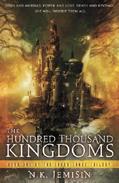 I once startled a friend by making the statement that you don't
encounter a lot of fantasy fiction written in non-western countries.
He looked at me like I was the biggest racist on the planet and asked me
to support my claim. I countered by telling him that it was just as
arrogant to assume that books based loosely on the legend of King Arthur
would hold as large a literary tradition in a country that cared
nothing for those legends. (We were in India at the time looking at the
book section so the conversation held a little more impact).
I once startled a friend by making the statement that you don't
encounter a lot of fantasy fiction written in non-western countries.
He looked at me like I was the biggest racist on the planet and asked me
to support my claim. I countered by telling him that it was just as
arrogant to assume that books based loosely on the legend of King Arthur
would hold as large a literary tradition in a country that cared
nothing for those legends. (We were in India at the time looking at the
book section so the conversation held a little more impact).And that's my problem with fantasy novels, the legend of King Arthur. The legend just sits there, squatting in front of whatever it is you might write. You can't ignore the fact that it's there, you either have to write along with it, or intentionally go against it and write something to be contrary. Do you put wizards into you fantasy novel? If so then he's based on Merlin or he's playing against the type of Merlin. Do you put knights into your fantasy novel? If so then how do they fare against the round table? Many people today will bring up Tolkein when they cite this problem, but Tolkein based quite a bit of his writing on the legend of King Arthur, so we'll start our complaint there. I don't need to list all the books that tip the hat to either King Arthur or Tolkein, they dominate the fantasy section at your local bookstore. It's still a very popular form of fiction, there's still quite a few books written every year that are in that direct vein, but there's not of enough originality in the fantasy genre.
All genres have their roots. You can't write a mystery novel without thinking about Raymond Chandler, you can't write a space military novel without thinking 'Starship Troopers.' Sometimes that's a good thing and sometimes that's bad. The originals in any genre just sit there and it's up to the writers of the future to build upon the foundation they laid, or to strike out in new directions. For fantasy in particular it's caused grief all across the genre, as far back as 1978 Michael Moorcock was saying fantasy needed to get away from what Tolkein wrote and spring in a new direction (see his essay 'Epic Pooh'). There will always be people who want to read a riff on the classics, but there needs to be more room made for those who wish to take the genre in a new direction.
That's why it's so nice to read a book like Kingdoms. It reminded me that this Arthur problem is only an issue with Fantasy novels written in western culture, that if you want to find a novel that is in no way based upon anything Tolkein came up with you need look no further than the next country over. As it turn out Jemisin is from Ohio, so maybe it's not as much a cultural thing as a writer thing. So much of the genre fiction being written today is influenced by western culture, think about the genres you read, whether western, romance, or science fiction. Readers today need to strike out in a new direction every once in awhile, read something that has never been presented to them before. There are more than enough fantasy novels featuring knights, wizards, magic jewels, and enchanted swords. I want gods that turn themselves into black holes like Jemisin has here.
While Jemisin is certainly not the first writer to take a new look at fantasy, she blends enough of the mythology of other cultures into the standard sword and sorcery genre to give the reader in western culture a new look. It seems like Jemisin completely ignored the tradition of fantasy and looked instead to the mythology of eastern culture to provide the basis for this novel. She takes the sort of strong, modern woman character that we are familiar with and places her into a world populated with ideas fairly foreign to us, and pulls it off pretty well.
Though it takes more to make a good novel than an original idea, Jemisin delivers on all accounts. The female lead is a strong character, well developed. The magic in the novel is delivered in an original fashion, and taken serious. The plot develops quickly, and the world is interesting and well developed. This was Jemisin's first novel (though she'd already won awards for her shorter fiction) and it shows. There are a few clunky portions, and several sections where a lighter touch might have served her better. But Jemisin is here to stay as a writer, and in Kingdoms she delivers a more than competent novel in a new and original fashion. This novel was the first in a trilogy and I look forward to reading the rest of the series.
No comments:
Post a Comment